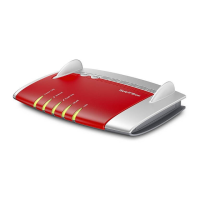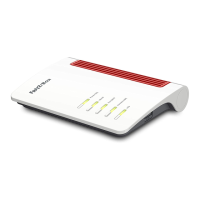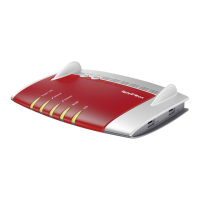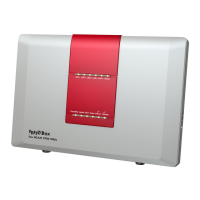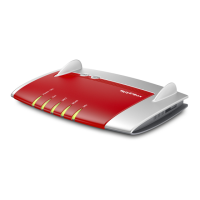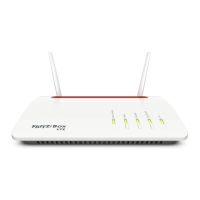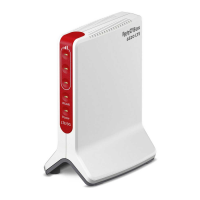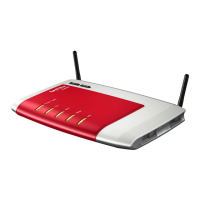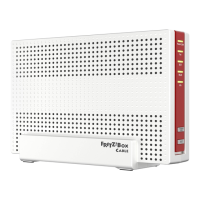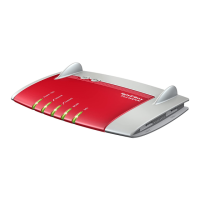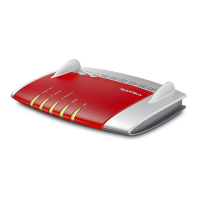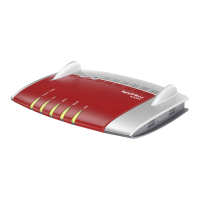Do you have a question about the Fritz! FRITZ!Box 4020 and is the answer not in the manual?
Important instructions for safe operation, preventing harm to users and the device.
Provides details on accessing manuals, online help, and support resources for the FRITZ!Box.
Explains the meaning of symbols used throughout the manual for important messages and tips.
Details the information found on the FRITZ!Box type label, such as serial numbers and network keys.
Lists the components included in the FRITZ!Box package for setup and operation.
Outlines the primary functions of the FRITZ!Box as an internet router, wireless access point, and home network hub.
Describes the connector panel of the FRITZ!Box, identifying LAN, WAN, and Power ports.
Details the functions of the physical buttons on the FRITZ!Box, such as WPS and WLAN controls.
Explains the meaning of the various LEDs on the FRITZ!Box and their states for status indication.
Specifies the requirements for operating the FRITZ!Box, including internet connection and computer compatibility.
Provides an overview of the steps involved in connecting the FRITZ!Box to power, internet, and devices.
Offers guidance on optimal placement of the FRITZ!Box for setup and wireless LAN reception.
Details the procedure for connecting the FRITZ!Box to the electrical power supply using the included adapter.
Lists the various connection options available for connecting the FRITZ!Box to the internet.
Explains how to connect the FRITZ!Box to the internet using a DSL or VDSL modem.
Guides on connecting the FRITZ!Box to the internet via a cable modem.
Details connecting the FRITZ!Box to the internet using a fiber optic modem.
Explains how to connect the FRITZ!Box to an existing internet router.
Describes setting up internet access for the FRITZ!Box using a mobile network connection.
Details how to connect a computer to the FRITZ!Box using a network cable.
Explains how to connect computers to the FRITZ!Box wirelessly using WLAN.
Provides an overview of the steps required for configuring the FRITZ!Box for internet access.
Guides through configuring internet access when using a DSL modem with the FRITZ!Box.
Details configuring internet access via a cable modem connection for the FRITZ!Box.
Explains how to configure internet access using a fiber optic modem with the FRITZ!Box.
Describes configuring the FRITZ!Box to connect via another router, acting as a router itself.
Details configuring the FRITZ!Box as an IP client to connect via another router.
Explains how to configure the FRITZ!Box to use an existing wireless connection from another device.
Guides on setting up internet access using a mobile network connection with the FRITZ!Box.
Provides tips on optimizing the FRITZ!Box location to extend wireless LAN range.
Discusses methods to expand the wireless network using FRITZ! products or repeaters.
Explains how to configure energy-saving settings for the FRITZ!Box to reduce power consumption.
Details how to expand the wireless network using Mesh technology with FRITZ! devices.
Explains the process of updating the FRITZ!Box to a version that supports Mesh networking.
Guides on integrating FRITZ!Repeaters into the FRITZ!Box Mesh network for extended coverage.
Describes how to integrate FRITZ!Powerline devices into the FRITZ!Box Mesh network.
Explains how to configure a FRITZ!Box to act as a Mesh Repeater in an existing network.
Introduces the FRITZ!Box user interface's overview menu and its main features and components.
Provides an overview of the FRITZ!Box's internet menu and its available settings and features.
Explains the use of AVM services for diagnostics, maintenance, and keeping the FRITZ!Box up-to-date.
Guides on configuring parental controls to manage internet usage for network devices.
Details how to create and assign access profiles for managing internet access restrictions.
Explains how to use filter lists (blacklist/whitelist) to block or allow access to websites.
Describes how to define priorities for network devices and applications for internet access.
Explains how to configure port sharing to allow incoming internet connections to specific computers.
Guides on enabling Dynamic DNS to maintain consistent internet access via a fixed domain name.
Covers protocols like HTTPS, FTP, and FTPS for accessing the FRITZ!Box user interface remotely.
Details how to configure VPN for secure remote access to the FRITZ!Box network.
Explains how to configure IPv6 settings for the FRITZ!Box and its supported services.
Describes how to configure the FRITZ!Box as a LISP router for advanced network routing.
Introduces the FRITZ!Box's home network menu and its configuration options for network devices.
Explains how to view and manage devices connected to the FRITZ!Box home network, including Mesh overview.
Details how to manage network connections and devices within the FRITZ!Box interface.
Guides on changing IPv4 settings, including IP addresses and subnet masks, for network configuration.
Explains how the FRITZ!Box DHCP server distributes IPv4 addresses to network devices.
Details how to change IPv6 network settings for the FRITZ!Box.
Explains how to configure static IP routes for specific network subnetworks.
Guides on configuring network devices to obtain IP addresses automatically via DHCP.
Details how to set up a separate LAN guest network for temporary users.
Explains how to configure the Wake on LAN function to start computers remotely.
Lists suitable USB devices and explains how to connect them to the FRITZ!Box.
Guides on configuring and using the FRITZ!Box media server to share media files.
Explains how to assign a custom name to the FRITZ!Box, which also sets the wireless network name (SSID).
Introduces the FRITZ!Box wireless menu and its features for configuring wireless networks and guest access.
Details how to manually switch the wireless network on/off or set up a schedule for it.
Explains how to adjust WiFi channel settings for optimal wireless performance and reduced interference.
Guides on setting up a separate wireless guest network for visitors, with options for private or public hotspots.
Presents the FRITZ!Box diagnostics menu, offering an overview of functional and security status.
Explains how to perform function diagnostics to check the status of the FRITZ!Box, internet, and home network.
Details how to run security diagnostics to review security-relevant settings and identify potential vulnerabilities.
Introduces the FRITZ!Box system menu, covering events, energy monitoring, notifications, and settings management.
Explains how to configure push services for notifications about FRITZ!Box activities and status updates.
Guides on customizing the signaling of the FRITZ!Box "Info" LED for specific events.
Details how to lock the FRITZ!Box buttons to prevent unintended changes to settings.
Explains how to set up FRITZ!Box user accounts and manage passwords for secure access.
Guides on saving FRITZ!Box settings to a backup file for future configurations or restoration.
Explains how to restore saved FRITZ!Box settings from a backup file.
Details how to restart the FRITZ!Box, either directly or via the user interface, to resolve issues.
Guides on updating the FRITZ!Box operating system (FRITZ!OS) for new features and security.
Explains how to restore the FRITZ!Box to its factory default settings, useful for troubleshooting or selling.
Describes how to change the language of the FRITZ!Box user interface from a selection of languages.
Explains how to adjust regional options to optimize telephony functionality based on the country of use.
Guides on setting the correct time zone for the FRITZ!Box to ensure accurate timekeeping and feature operation.
Introduces the FRITZ!Box wizards that guide users through step-by-step configuration of functions.
Explains the features of FRITZ!NAS for displaying and accessing data on FRITZ!Box storage media.
Details how to expand FRITZ!NAS storage using online storage or USB media.
Guides on accessing FRITZ!NAS storage through Windows Explorer or macOS Finder.
Explains how to save data stored on the FRITZ!NAS to a file.
Introduces MyFRITZ!, a service providing additional functions for remote access to the FRITZ!Box.
Guides on creating a MyFRITZ! account, necessary for using the myfritz.net website and iOS app.
Details configuring the MyFRITZ!App on Android devices for remote access to FRITZ!Box features.
Explains how to configure the MyFRITZ!App on iOS devices for remote access to FRITZ!Box features.
Offers recommendations for resolving common problems encountered with the FRITZ!Box.
Provides a chart listing common error scenarios, their causes, and solutions for troubleshooting.
Explains how to access the FRITZ!Box user interface using an emergency IP address when normal access fails.
Directs users to the AVM Knowledge Base for answers to frequently asked support questions.
Provides information on how to contact AVM support for assistance with FRITZ! products.
Explains how to delete personal data and settings from the FRITZ!Box before decommissioning.
Provides information on the proper disposal of the FRITZ!Box and its electronic components according to regulations.
Lists the technical specifications of the FRITZ!Box, including dimensions, voltage, and operating conditions.
Provides a drilling template for mounting the FRITZ!Box on a wall, with instructions for printing.
Contains manufacturer's warranty information and legal notices regarding the product and its software.
Offers guidelines on how to clean the FRITZ!Box safely and effectively.
| Router Type | Wireless Router |
|---|---|
| Frequency Band | 2.4 GHz |
| Wireless Speed | Up to 450 Mbps |
| Ports | 4 x LAN, 1 x WAN |
| Firewall | Yes |
| Wireless Standard | 802.11n |
| VPN Support | IPSec |
| Special Features | Guest Wi-Fi, Parental Controls |
